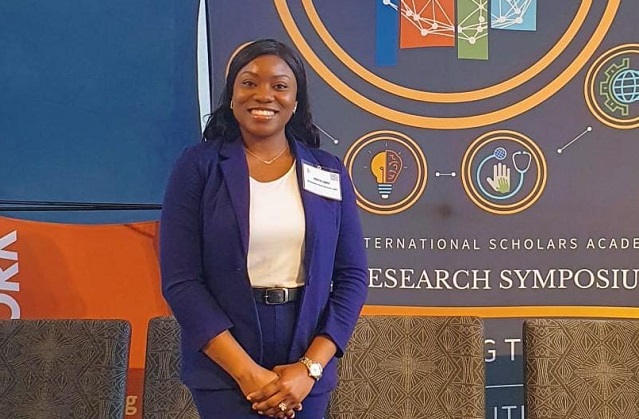Judith Sokei is an expert in therapeutics and transformative cancer research. In this exclusive interview with SEGUN ADEBAYO, she shares on journey of advancing healthcare.
Your journey in cancer therapeutics seems to be truly inspiring. Can you share a bit about your background and what sparked your interest in this field to pursue transformative cancer treatments?
I had always had this innate curiosity about health issues from a very young age. I felt a strong pull towards science, particularly in the context of advancing healthcare. This led me to pursue a Bachelor of Pharmacy in college, setting the stage for exploring transformative cancer therapeutics. My interest in cancer therapeutics was ignited during my clinical rotations. Witnessing the challenges faced by cancer patients and their families was a profound experience that fueled my determination to contribute to revolutionary treatments. The desire to turn a cancer diagnosis from a dire situation to one filled with hope has been a driving force in my career.
How did your expertise in nanotechnology contribute to this, and what is the potential impact it could have on cancer patients globally?
Nanotechnology provides a unique platform for drug delivery optimization. My expertise in this field allowed me to design nanoformulations tailored to specific cancer types. By leveraging the properties of nanomaterials, we can enhance drug delivery precision, reduce side effects, improve the efficacy of cancer therapies, and ultimately improve the overall quality of life for cancer patients worldwide.
Your nanoformulation from indigenous plant extracts is intriguing. Could you elaborate on how this scientific breakthrough evolved?
Certainly, I started my research by exploring traditional medicinal plants and their potential in cancer treatment. The nanoformulation stemmed from combining my pharmaceutical expertise and molecular biology skills. For testing, I used the preclinical colorectal cancer models, where the formulation demonstrated significant activity, leading to testing across multiple preclinical cancer models. The filed patent with the Kenya Industrial Property Institute underscores its potential significance in advancing cancer therapy.
Your current research focus is on leukaemia. Could you shed more light on this?
My Ph.D. research centres on Acute Myeloid leukaemia, or simply AML, which is a form of blood cancer that affects both adults and children. On average, 70 per cent of these patients die within 5 years, and as such, it ranks as one of the deadliest cancers in both age groups. This bleak outcome is primarily due to the ineffectiveness and toxicity of existing therapies; it, therefore, highlights the urgent need for new and better treatments. My research focuses on unraveling the role of specific amino acids and enzymes in AML. By understanding these molecular intricacies, I aim to develop new, safe, and effective targeted therapeutics in AML and, by extension, other cancers. My overarching goal is to contribute to a future where a cancer diagnosis is not synonymous with a death sentence.
Your academic journey has been eventful; You have also earned multiple prestigious awards, including the Stephen Oluwole Awokoya Foundation award (SOAFSE), African Union (AU) grant, the Japan International Cooperation Agency (JICA) research award, and recently the McDonnell International Scholar’s Academy Fellowship. What motivates you to maintain such high standards?
I am thankful for the opportunity to have won all these awards. My motivation comes from a deep-seated passion for advancing the field of oncology and making a meaningful impact. Recognising the potential of my research to contribute to solving global health issues fuel my commitment to excellence. Awards and accolades serve as affirmations, but the ultimate motivation lies in the potential positive outcomes of my work in the lives of people living with cancer.
Beyond your achievements, one is curious about your personal side. What do you enjoy doing outside of the research lab?
Another profound passion of mine, outside of my research, is mentorship. Whether participating in mentorship forums or engaging in one-on-one sessions with mentees, I find great fulfillment in helping others unleash their capabilities. Additionally, I enjoy bonding and staying connected with my family.
How did your own experiences with mentors influence your decision to actively engage in guiding aspiring scientists?
Mentorship has been pivotal in my journey, and I’ve been fortunate to have had supportive mentors. However, I observed that many of my peers lacked similar opportunities. Recognising the power of mentorship, especially in encouraging diversity in STEM fields, I am deeply passionate about guiding aspiring scientists. Whether back home in Nigeria or here in the U.S., I want to contribute to nurturing the next generation of scientific talent.
In your mentorship activities, what advice do you often share with aspiring scientists, especially those facing challenges in pursuing STEM fields?
I often emphasize resilience and the importance of embracing challenges as opportunities for growth. I encourage them to seek mentorship, ask questions, and persist in pursuing their goals. Diversity is a strength in STEM, and I advocate for creating an inclusive environment where everyone, regardless of background, feels empowered to contribute to scientific advancements.
Looking ahead, what other plans do you have?
My goal extends beyond advancing scientific knowledge to also bridging the gap between research and clinical applications not only in the developed regions but also underserved areas. Ultimately, I envision a future where cancer is no longer a global menace or a death sentence and I am excited about the possibilities and journey toward a cancer-free future.
